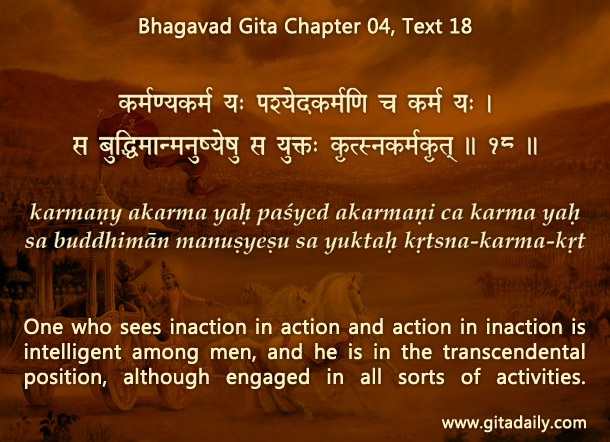Apart from several general meanings of the word ‘karma’, the Bhagavad-gita uses this word in certain specific senses.
- Action that give good results: In this sense, the Gita (04.17) places karma within a tripartite classification: karma (action that lead to positive reactions), vikarma (action that leads to negative reactions) and akarma (selfless action that takes us outside the jurisdiction of the law of karma). While Arjuna thinks of his choices only in terms of the first two categories — good actions and bad actions — the Gita’s recommendation centers on the third category.
- Action that places us within the law of karma or cosmic accountability: In this sense, karma refers to almost all human actions: namely, actions are motivated by personal desires and are aimed toward personal gains. The Gita (04.16) contrasts this sense of karma with akarma, action that doesn’t bring any karmic reaction.
- Right action: In this sense, karma refers to the Gita’s recommended course of action. If Arjuna understands what karma is and thereby chooses the right course of action, he will progress toward liberation (04.16)
The Gita integrates various meanings of karma in one of its most enigmatic verses (04.18): the wise see akarma in karma and karma in akarma. Let’s decode the first part of this verse. The wise understand that there will be no karmic reaction (akarma) when one does the right action (karma). To better understand this, let’s see how it applies to Arjuna’s battlefield context. He will incur no negative reactions if he does his duty of fighting in a mood of detachment and devotion. Let’s now focus on the second part of the verse. The wise understand that there will be reactions (karma) when one stops doing the right action (karma). How does this apply to Arjuna? If he neglects his duty as a martial guardian of society to protect his citizens from unscrupulous power-grabbers, he will be like a negligent police officer who stays passive amid a riot — he will incur severe negative karmic reactions.
***
04.18: One who sees inaction in action and action in inaction is intelligent among men, and he is in the transcendental position, although engaged in all sorts of activities.
To know more about this verse, please click on the image


Geeta guide to right action